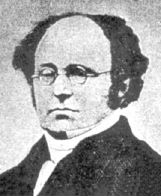

Augustus De Morgan lost the sight of his right eye shortly after birth. At school he did not excel.
De Morgan entered Trinity College Cambridge in 1823 at the age of 16. He
received his B.A. but a theological test was required for the M.A., something to which De Morgan strongly objected. In 1826, he returned to his home in London and entered Lincoln's Inn to study for the Bar. In 1827, he applied for the chair of mathematics in the newly founded University College in London and, despite having no mathematical publications, he was appointed.
He wrote a popular book Elements of arithmetic in 1830. In 1849, he published Trigonometry and double algebra, in which he gave a geometric interpretation of complex numbers. He also wrote a popular calculus book.
In 1838, he defined and introduced the term "mathematical induction", putting a process that had been used without clarity on a rigorous basis.
He recognized the purely symbolic nature of algebra and he was aware of the existence of algebras other than ordinary algebra. He introduced De Morgan's
laws and his greatest contribution is as a reformer of mathematical logic.
In 1866, he was a co-founder of the London Mathematical Society and became its first president. In the same year De Morgan was elected a Fellow of the Royal Astronomical Society.
De Morgan was never a Fellow of the Royal Society, as he refused to let his name be put forward. He also refused an honorary degree from the University of Edinburgh.